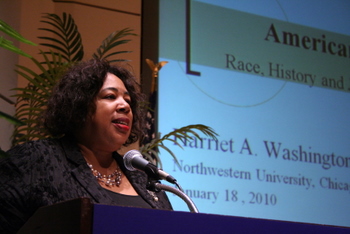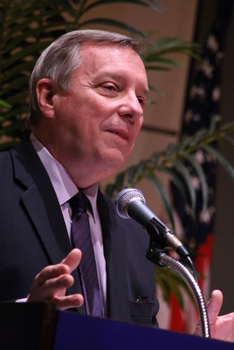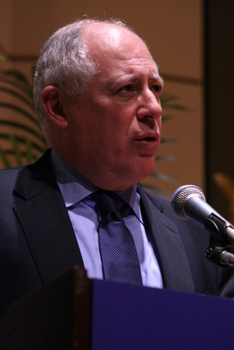 |
|
Award-winning author Harriet Washington delivered the keynote address at Northwestern University’s Dr. Martin Luther King Jr. Celebration 2010 on the Chicago campus.
|
Northwestern Celebrates MLK Day
Healthcare disparities in the U.S. are “deeper than a mass grave,” said keynote speaker Harriet Washington during her keynote address at Northwestern University’s Dr. Martin Luther King Jr. Celebration 2010 on the Chicago campus.
The award-winning Washington is the author of “Medical Apartheid: The Dark History of Medical Experimentation on Black Americans from Colonial Times to the Present.”
The event opened with a rousing performance by the G3 youth gospel choir and included remarks from U.S. Sen. Richard Durbin and Illinois Gov. Pat Quinn.
The overriding theme of the Chicago program was injustice in healthcare, which King had called “the most shocking and the most inhumane” form of inequality, Washington noted.
 |
|
U.S. Senator Richard Durbin discussed the need for health care reform at Northwestern’s MLK Day celebration.
|
 |
|
Illinois Governor Pat Quinn noted that Dr. King said that creating fundamental change requires collective action. |
“The real barriers [to equality] are in the hearts of men — the assumption that some people have the right to certain types of care and certain people don’t,” she said.
In her talk, she detailed the nation’s long and shameful history of medical experimentation on African Americans that continued through the 1990s. One famous surgeon in the 1800’s didn’t use anesthesia on blacks because he believed they did not feel pain. Today blacks are less likely to receive adequate treatment for pain, and black infants are two to three times more likely than white infants to die, Washington said.
To fix current inequities, Durbin emphasized the importance of healthcare reform, noting that “47 million Americans are without healthcare in the U.S.” He pointed to a young man in the audience who was unable to get his lymphoma diagnosed for three years because his mother, a part-time dental assistant, couldn’t afford health insurance. Durbin said the healthcare reform bill in Congress would increase the number of insured in America by 30 million and cover 95 percent of Americans.
Quinn, an alumnus of Northwestern University School of Law, noted that Dr. King stressed that creating fundamental change requires “a collective of people to come together for a cause they believe in…It was a movement of many people who used their feet to march to bring down the walls of Jim Crow.”
Dr. King’s legacy also was reflected upon by Northwestern President Morton Schapiro, J. Larry Jameson, MD, PhD, vice president for medical affairs and Lewis Landsberg Dean at Northwestern University Feinberg School of Medicine, and David Van Zandt, dean of the Northwestern University School of Law.
The DREAM Award, for commitment to social justice and equality in law or medicine, was presented to Carmen Velasquez, executive director of the Alivio Medical Center, and the winners of the Martin Luther King Jr. Youth Art Contest were honored. The colorful artwork of the contest winners was displayed in the lobby.
On the Evanston campus, the Ramsey Lewis Trio and Victor Goines, director of jazz studies at the Bienen School of Music at Northwestern, performed a spectacular jazz medley. And a Q&A with jazz great Ramsey Lewis, led by Bienen School of Music student Kyle Ashe, was among a host of offerings that have been taking place on both campuses in memory of the life and legacy of Dr. King.
Classes were suspended on both campuses Monday for a University-wide, full-day observance of the Martin Luther King Jr. Day holiday. The life and legacy of Dr. King was reflected through lectures, service opportunities, discussions, films, music and theater.






